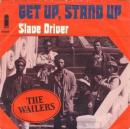John Henry had a woman
Polly Ann, Polly Ann
John Henry had a woman
Polly Ann, Polly Ann
When John was sick Polly drove steel
Like a man, like a man
When John was sick, Polly drove steel
Like a man, Lord, like a man
"Polly can you lift that hammer?"
"Yes I can, Yes I can
"I can swing it, I can strike it
"Harder than any man can"
When Polly had a small baby
On her knee, on her knee
Grabbed a hammer in her left hand
"Ain't no one as strong as me"
This little hammer killed John Henry
Won't kill me, won't kill me
This little hammer killed your daddy
Throw it down and we'll be free
Polly Ann, Polly Ann
John Henry had a woman
Polly Ann, Polly Ann
When John was sick Polly drove steel
Like a man, like a man
When John was sick, Polly drove steel
Like a man, Lord, like a man
"Polly can you lift that hammer?"
"Yes I can, Yes I can
"I can swing it, I can strike it
"Harder than any man can"
When Polly had a small baby
On her knee, on her knee
Grabbed a hammer in her left hand
"Ain't no one as strong as me"
This little hammer killed John Henry
Won't kill me, won't kill me
This little hammer killed your daddy
Throw it down and we'll be free
envoyé par Dq82 - 12/4/2019 - 11:23
×
![]()








Amythyst Kiah, vocals and 5-string banjo;
Rhiannon Giddens, backing vocals and fiddle;
Jamie Dick, drums;
Dirk Powell, guitar;
Jason Sypher, bass
Per capire meglio in cosa consistano riappropriazione e rovesciamento di punti di vista, partiamo dagli stilemi folk di “Polly Ann’s Hammer” – guidata dal violino di Giddens – che riscrive il tradizionale “John Henry”, storica protest song sullo sfruttamento dei lavoratori, qui centrata sulla vedova di John, che appare nella parte finale della canzone originale («John Henry had a woman / Well her name was Polly Ann /Well John Henry took sick and he had to go to bed / Well and Polly drove steel like a man (well, well)/ Well and Polly drove steel like a man»). Nella riscrittura delle Daughters, Polly si appropria del martello con cui è stato ha ucciso il marito e ne fa un simbolo di affrancamento dallo sfruttamento («This is the hammer, killed John Henry/won’t kill me, won’t kill me»).
blogfoolk.com
Polly Ann—the real hero of the John Henry legend—was hiding in plain sight all along.
John Henry’s woman, Polly Ann wields his hammer for him when he falls ill and “drives steel just like a man.” The supposedly weaker sex survives the work that kills John Henry, raises the babies, and perhaps lives long enough to see their children campaign for civil rights and true freedom. — AR
Dal libretto dell'album